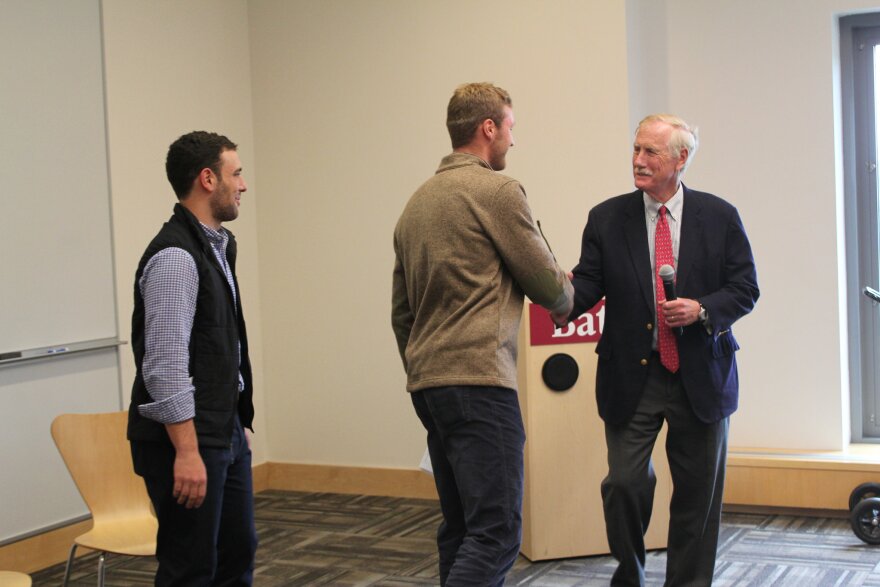Between walkouts over gun violence and rallies protesting presidential nominees, young people have been particularly politically active in recent years. For college students, the push now is to turn that newfound civic engagement into turnout at the polls.
Only a few years ago, Maddy Smith was a high schooler who had barely a passing interest in politics. Fast forward to today, and Smith sits at a table outside of the dining hall at Central Maine Community College, passing out flyers, advocating for candidates and registering students to vote in next month’s midterm elections.
Smith first arrived in Maine about two years ago to study at Bates College in Lewiston, and as a freshman helped a few campaigns and protested as part of a group called Bates Student Action. However, Smith’s attitude changed drastically after the 2016 election.
“Ultimately a lot of anger did drive me to action,” Smith says. “Because, through Trump getting elected, that was a time at which, I was scared for myself as a queer person and also my friends who held many other marginalized identities, as well.”
Over the next few months, Smith participated in more protests — even began leading them on campus — and connected with students at other schools with similar messages. This summer, Smith decided to take a year off from Bates to commit full-time to organizing as part of a larger, statewide organization: Maine Student Action.

“There wasn’t really anyone who was doing statewide student organizing,” Smith says. “And there was a scary moment where I realized, ‘Oh, I could be that person.’ It was both a little bit terrifying and very exciting.”
After just a few months, more student organizers have joined from around Maine, including Colby, Bowdoin College and the University of Maine in Orono. Smith was part of a team that organized a few rallies. But right now, Maine Student Action’s focus is engaging fellow college students and getting them to the polls next month.
Smith’s organization isn’t alone. Across colleges campuses in Maine, and the nation, students are trying to change civic attitudes and boost midterm turnout numbers that are traditionally meager.
“One of the things, of course, about the 2016 election, was that it was a wakeup call to higher education,” says Nancy Thomas, the director of the Institute for Democracy & Higher Education at Tufts University.
Thomas says after the election, many campuses saw that less than half of their students had voted. She says for many, that wasn’t good enough.
“So what we’re seeing on college campuses is an uptick in things like civic learning programs. Issue forums,” she says. “Faculty are nudging, if you will. They’re saying to students in class, ‘Don’t forget to vote. Don’t forget to register.’“
A recent poll of 18- to 24-year-olds from Tufts University found that 34 percent were “extremely likely” to vote next month — numbers comparable to the 2016 election and higher than traditional midterm turnout. The poll also found that far more are getting involved outside the voting booth, too, attending marches and signing petitions.
At Bates College, that involvement has crossed ideological lines. Maya Seshan, president of the Bates College Democrats, says this year, her group is prioritizing voter turnout above all else — even above electing Democratic candidates.
Seshan says a coalition of groups are supporting voter turnout, from the outing club to the lacrosse team.
“Something like, debate team,” she says. “Any athletics team we can get involved voting is amazing. We’ve had the football team do a voter registration day. I fully plan on walking the rowing team to the polls right after practice on Election Day itself.”
Jeremiah Childs, with the UMaine College Republicans, says in the past two years, his group has grown from just a few members to a mailing list of more than 100 students. He says during the election season, the group has focused its effort off-campus, though, talking to potential voters in more rural areas.
“So we find that the more rural, less densely populated the area, the more likely they’re going to be a Republican voter,” he says.
And with a number of colleges, including the University of Maine and Bates College, in the state’s 2nd District, college students could be consequential in the race between Republican incumbent Rep. Bruce Poliquin and Democratic challenger Jared Golden.
Researchers at Tufts University also found that young people in Maine could have one of the largest effects on Maine’s gubernatorial election, due to the race’s competitiveness and high youth turnout in past elections.
Yet no matter who wins, students say they hope the midterms are just the beginning of a sustained effort to keep young people engaged in the political process.
Seshan says she wants candidates to recognize the power of the college vote, so they can help those students stay in Maine once they graduate.
“It’s a little bit hard to understand why our representatives, and why people in Congress and the Senate, even our gubernatorial candidates, don’t speak more to the students who understand those issues,” she says.
Seshan hopes that, come November, those representatives will hear their voices — loud and clear — at the ballot box.
Education reporting on Maine Public Radio is supported by a grant from the Nellie Mae Education Foundation.
Originally published 3:51 p.m. Oct. 24.



